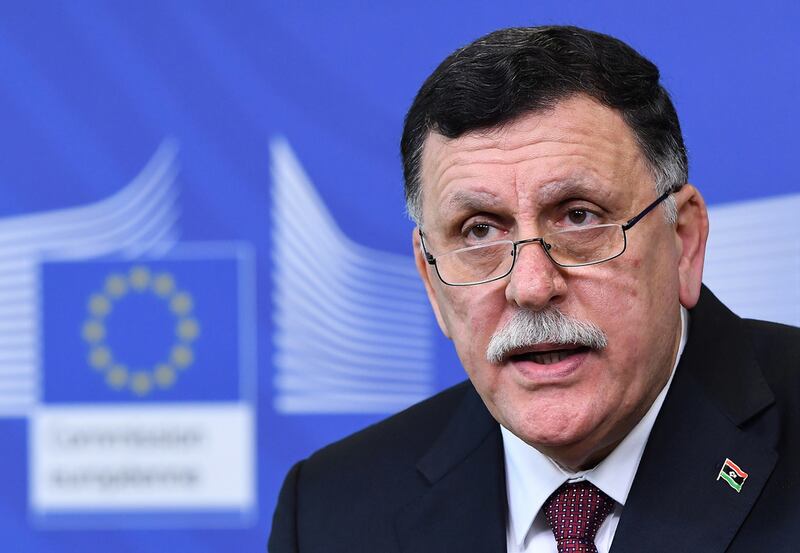Last week, Abu Dhabi hosted the first face-to-face meeting between Fayez Al Sarraj, the prime minister of Libya's UN-backed government based in Tripoli, and Field Marshal Khalifa Haftar, commander of the Libyan Armed Forces based in Benghazi and backed by the Tobruk parliament. The meeting was a breakthrough engineered by, and credited to, the UAE’s active diplomatic mission as it strives to find a workable political settlement in Libya.
International powers and regional countries, including Egypt, Tunisia and Algeria, all tried to facilitate such a meeting but failed.
Neither Mr Al Sarraj nor Field Marshal Haftar recognise each other’s legitimacy, while both sides claim they are legitimate in their own right, based on the support each side enjoys in the east or west of the country.
However, the fact that the meeting took place at all appears to show that each party implicitly recognises the other’s legitimacy, however that might be politically interpreted.
Sources close to both sides talked of the positive vibe that prevailed between the two men. Mr Al Sarraj said afterwards in which he said that he agreed with Field Marshal Haftar about the need for a peaceful settlement, refraining from using force, helping reorganise a united Libyan army under a civilian leadership and helping ease the economic burden on ordinary Libyans.
The question now is how far could both sides go in bringing about peace to a country dominated by militias? And how serious are they about alleviating the increasingly difficult situation ordinary Libyans struggle with every day?
Field Marshal Haftar is a dominant figure in eastern Libya and backed by the elected parliament. He also enjoys widespread public support, thanks to his military successes over the past three years, in which his forces liberated Benghazi and brought about partial peace.
He has also made military advances in southern and western Libya after gaining control of the strategic oil terminals this year. However, he does not accept the UN-brokered Libyan Political Agreement, LPA, which made Mr Al Sarraj head of the Government of National Accord.
The GNA has so far failed to achieve much and it enjoys little public support, since it lacks military power and can barely control the capital Tripoli.
Its strength is based on the general support it enjoys from the international community. The GNA has been recognised by many countries as the sole legitimate government in Libya. Indeed, forces claiming loyalty to the GNA managed to claim some victories against ISIL in Sirte late last year. In fact, those forces are not really under the control of the GNA, but are dominated by Misurata militias.
While there was a sense of optimism among Libyans that the meeting may lead to further dialogue and could bring about some sort of settlement, there are hardliners in both eastern and western Libya who do not wish to see any success at all, since their very existence is on the line.
Armed groups understand that any political settlement would, inevitably, usher in a more effective central government, which would be backed by a stronger military. The inevitable consequence of that would be a shrinking of the sphere of influence for those militias.
Islamist forces in western Libya in particular are already sworn enemies of Field Marshal Haftar and, to a lesser extent, of the GNA. They are not willing to accept any agreement that might leave them frozen out of the equation.
Sadiq Al Ghariani, the self-styled grand mufti who is also politically sympathetic towards Islamists, has already gone public with his opposition to any agreement that might emerge from discussions between the GNA and Field Marshal Haftar.
He has been a strong supporter of the different Islamist groups Field Marshal Haftar has been fighting in Benghazi since 2014. Mr Al Ghariani has been calling them “revolutionaries” even while some of them openly support ISIL and other terror groups.
The next step that could be taken now is to try to amend the Libyan Political Agreement in a way that brings the necessary assurances to Field Marshal Haftar, while maintaining the overall essence of the agreement as the generally accepted settlement.
It remains to be seen if the current diplomatic effort is willing to push towards a more workable agreement. With one big success so far, there is no reason why this could not happen.
Mustafa Fetouri is a Libyan academic and journalist





